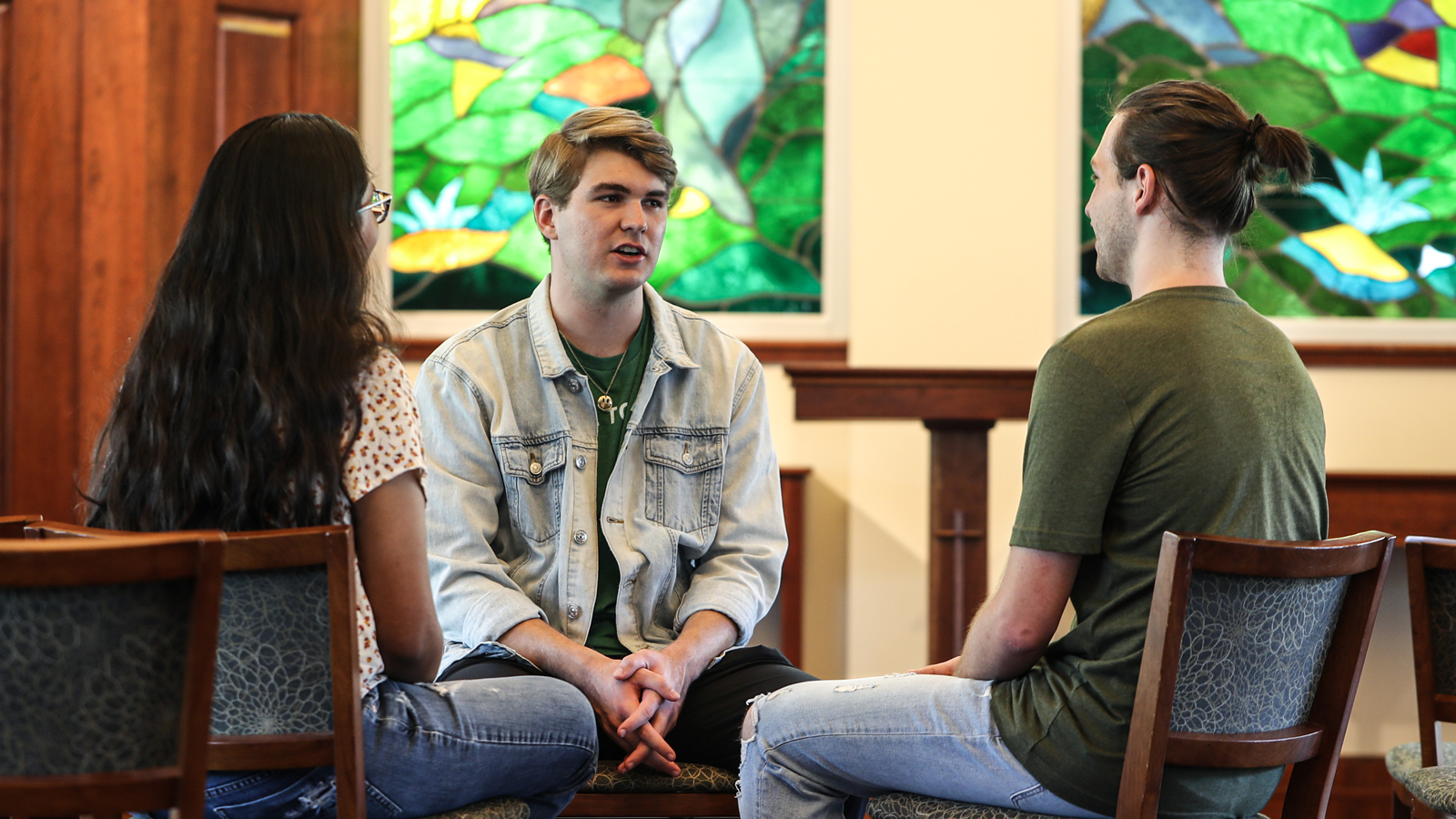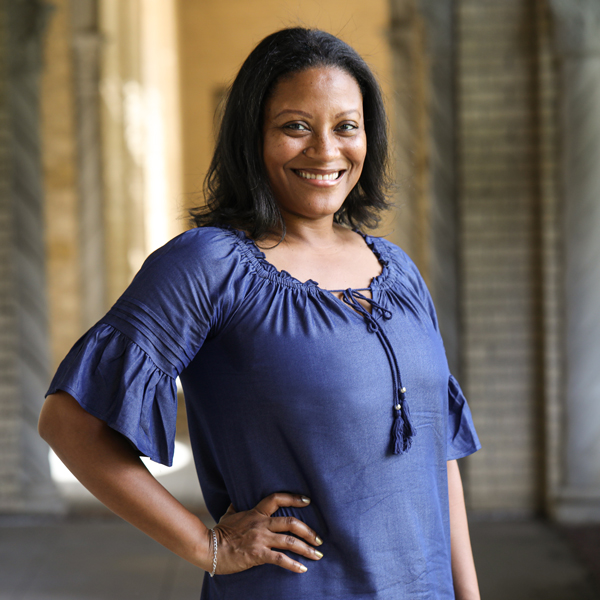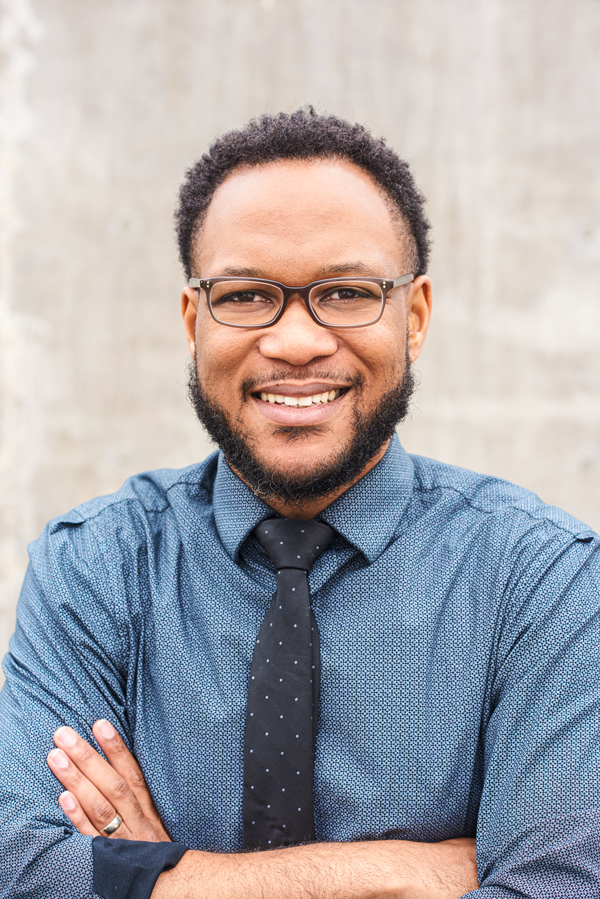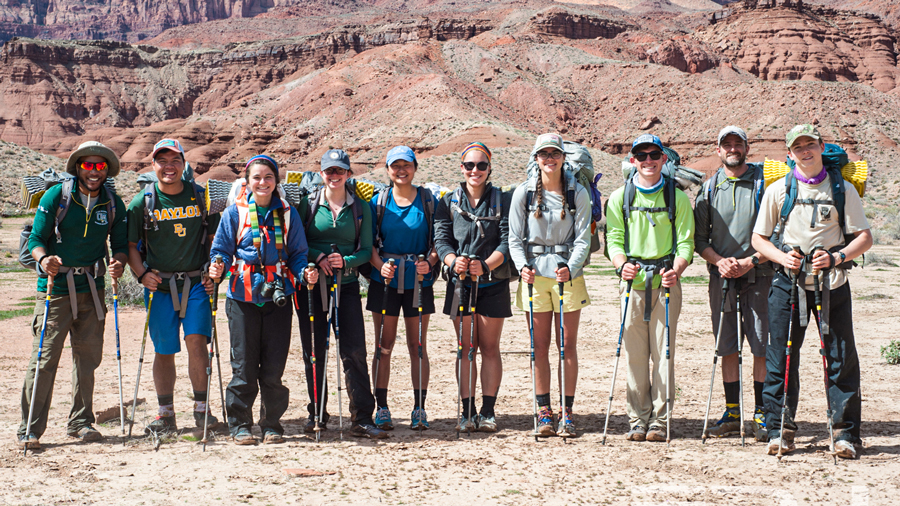Beyond the Residence Hall
Baylor resident chaplains shepherd undergraduates while preparing for ministerial careers
Samuel Moore, B.A. ’19, (pictured above right with students) vividly remembers his freshman year and the somewhat daunting horizon that lay before him. Unfamiliar environments, academic rigors and social pressures can be formidable for the most well-prepared and mature first-year college student.
Now, as a Master of Divinity candidate in Baylor’s George W. Truett Theological Seminary and Martin Hall resident chaplain, Moore supports freshmen males as they begin their college journey.
“I see them struggle with the same things I struggled with — identity and finding out how to balance this picture of who you are and who you want to be,” Moore says. “I see them excited about the same things I was excited about at their age. Because of that, I can share with them where I went wrong or what was really good. Hopefully, this helps them achieve their goals or stay away from pitfalls.”
Baylor resident chaplains are Truett Seminary students who live in campus residential communities and provide pastoral care and leadership to the students they serve. The resident chaplain program, which began in 2001, works with the Department of Pastoral Care in the Office of Spiritual Life in conjunction with Campus Living and Learning (CL&L).
Baylor University Chaplain and Dean of Spiritual Life Burt Burleson, B.A. ’80, D.Min., returned to a direct role with the resident chaplain (RC) program this fall.
“This kind of work — pastoral care — has been my passion from early in my ministry,” Burleson says. “When I returned to Baylor in 2007, the program was in its infancy. The University was committed to it, but how we train resident chaplains and supervise them was pretty new.”
Kristen Richardson, M.S.Ed. ’05, M.Div. ’05, coordinated the program for several years before moving to another part of the state. She and others are largely to thank for what today is a robust roster of resident chaplains who serve multiple years and along the way become peer mentors to incoming RCs.
“It’s not unusual for us to get phone calls from people who are coming to Truett with a high level of interest in this opportunity,” Burleson says. “Our typical protocol is to let them get adjusted to seminary first because being an RC is an adjustment as well. We see a big difference between someone in their first year and their second year.”
The recruitment cycle for new RCs typically begins in December with a hard push in January and an application deadline in February. A team that includes Burleson and other Spiritual Life and CL&L staff whittles the list of applicants by April and selects new RCs for the fall semester. An average year sees four or five new RCs replace those who graduated the previous spring.
The word “chaplain” comes from the Latin cappellanus, meaning “of the little cape” (cappella being a diminutive of cappa [cape]). It was first bestowed in the fourth century upon Franks who preserved the famous half cape of St. Martin of Tours, who, while stationed in Gaul, tore his military cloak in half and gave it to a beggar. The sense of “chapel” derives from this experience.
“Chapels weren’t initially considered churches; they were little outposts — chaplains in a particular context,” Burleson says. “There was this idea of taking the ministry of the church into prisons or hospitals or early universities. We’re replicating that here at Baylor by putting someone in the particular context of residential communities.”
Resident chaplains walk with students through an array of trials, including dashed academic dreams, questions of faith, food insecurity, loneliness and anxiety, and the loss of a family member or friend. The COVID-19 pandemic layered an additional blanket of challenges for students and resident chaplains alike.
“You could no longer knock on a door and say, ‘Hey, I heard about your mom’s diagnosis. Would you like to go for a walk or get a cup of coffee?’” Burleson says. “You could only write or talk on the phone, and that sense of presence is part of a chaplain’s ministry.”
Resident chaplains were arguably more vitally important than at any previous time, and it was simultaneously more arduous to have that presence with students. The inability to build community through physical means — a handshake, a hug, a pat on the back — was stifling for chaplains as much as students. Nonetheless, Moore says his experience as an RC has been rewarding and a blessing.
“Working with college students is something that gives me a lot of life,” Moore says. “There are the hard days when you’re doing hospital visits, and there are the great days when someone runs to your door to tell you they aced a test. All of it is so meaningful.”
Authentic Family Environment
Eufaula, Alabama, native Chase Haney earned a marketing degree at nearby Troy University, where he and some friends started a college ministry. He was encouraged to consider Truett Seminary by a mutual friend of R. Robert Creech, Ph.D. ’84, holder of the Hubert H. and Gladys S. Raborn Chair of Pastoral Leadership and Director of Pastoral Ministries at Truett. Ultimately, the possibility of being a resident chaplain sold Haney on the notion.
“My initial concern, which wasn’t factual, was that I was going to be like the dorm police. Thankfully, that’s not what my job is,” he says.
Haney earned a scholarship to Troy but quickly realized accounting was not in his future. Thereafter, he dipped his toe into the pool of college ministry and soon felt called to the field. Casual acquaintances became accountability partners, and God charted a path for Haney to serve.
“I saw God touch the people around me through building a community,” Haney says. “It seemed to be what everyone was looking for — to be around other Christians and get into the word in fellowship. We kept it simple, whether that was having an actual service or playing basketball together.”
Furthermore, Haney felt called to attend Truett Seminary. He admits that attending a university with a strong athletics program and live bears on campus was what initially piqued his interest. However, he quickly found something special at Baylor.
“There are only a few universities that, when people start to describe them, one of the first things they say is ‘family environment,’” Haney says. “It’s really cool to be a part of the Baylor Family. It’s authentic.”
Haney, who is resident chaplain for Allen and Dawson residence halls, describes his role as a resident chaplain as largely helping students process what is happening in their lives. He says living in the same space as the students he serves makes this interaction a natural fit.
“I’m doing my job to a ‘T’ when I take a student for coffee, ask about their life and go from there,” Haney says. “Sometimes, it’s mourning; sometimes, it’s celebration.”
Sometimes, it’s talking through a situation involving academics or potential career direction. When it comes to conversations with a student who feels overwhelmed, Haney says it is important for the student to know he is there to listen more than to speak.
“Students have a lot of voices being spoken into them,” Haney says. “I want them to find in me someone who will listen to them, process with them and not be another voice in their ear.”
Moore was surprised by the extent to which the resident chaplain-student relationship is mutually beneficial. He did not expect that he would be ministered to by the community of students as much as he ministers to them.
“I expected to be a mentor for a lot of students, and that has happened, but I didn’t expect to be such a friend to so many 18-year-old guys,” Moore says. “It’s been so much fun to get to know these people and continue to develop those relationships. It’s fun for me to see these guys come in really not knowing who they are and having a hand in helping to form them and point them toward Christ. It’s one of the most rewarding things I’ve ever done.”
Long Way from Home
Baylor’s resident chaplain program focuses on pastoral care for undergraduate students, but it also prepares the chaplains for ministry beyond their time at Truett Seminary.
Monica Stephenson, M.Div. ’20, is a biblical counseling master’s candidate at Dallas Theological Seminary (DTS). She aspires to be a trauma therapist and wants to help people understand how to integrate faith with psychology. Stephenson also is president of Arise, a DTS women’s fellowship group.
“We walk alongside women during their time as DTS students,” she says. “DTS has a long history of online learning, but we have a high drop-off rate for those who are taking classes online because they don’t have community. Arise creates opportunities for our female students to have community with each other, however they may be attending school.”
Stephenson’s journey to ministry followed a long and winding path. She was a resident assistant at Indiana University Bloomington, where she earned a bachelor’s degree in computer information systems and international studies. Recruited by ExxonMobil out of college, Stephenson spent the next 15 years in the corporate world. She implemented various IT projects, first in energy waste, then energy healthcare and finally solar energy. Along the way, she realized an interesting development.
“I had teams reporting to me, and my responsibility was to get work done through these people. Sometimes, I spent more time counseling people and helping them work through some of their personal issues than actually doing the job,” Stephenson says. “Increasingly, I enjoyed the counseling side of it.”
On a trip to the Holy Land with Chuck Swindoll’s Insight for Living ministry, Stephenson met a DTS faculty member who helped her understand that seminary is for more than future preachers. The idea of being a chaplain in a university setting also was appealing. Stephenson was accepted into Truett Seminary and soon became a resident chaplain.
“To me, it was God affirming something I had imagined being able to do and allowing me to do it,” she says. “I loved the emphasis on spirituality at Baylor and the idea of cultural humility.”
Stephenson glows when talking about her time at Baylor. This includes when President Linda A. Livingstone, Ph.D., asked to hold Stephenson’s infant daughter. She also praises the personability and approachability of Todd D. Still, B.A. ’98, Ph.D., the Charles J. and Eleanor McLerran DeLancey Dean of Truett Seminary and holder of the William M. Hinson Chair of Christian Scriptures.
“Baylor felt like home,” she says. “Being a chaplain afforded me a greater opportunity to speak into the spiritual lives of others. In my corporate career, I couldn’t go there for obvious reasons, and it felt incomplete to me. There were sides of people who really could have benefited from the integration of their faith and their faith practices into their experiences.”
Stephenson saw people “come alive” during her time as a Baylor resident chaplain. She remembers one student who came to Baylor from the Northeast, leaving behind his family and everything he knew. He was struggling and eventually developed suicidal ideation. Fortunately, someone suggested he talk to his resident chaplain.
“I tried to provide space for him to be able to talk about where he was and what was going on with him,” Stephenson says. “It was life-giving for him. He was able to come from that really dark place into experiencing Baylor in a fuller way, and now he’s thriving. I’m so happy to have been a part of what God was doing in his life at that time. That’s what the chaplain role is to me, and that’s what I’m taking forward in the work that I’m doing in counseling.”
Empathetic Listening
Like Stephenson, Emmitt Drumgoole, M.S.Ed. ’19, M.Div. ’19, took an indirect path to the ministry. Unlike Stephenson, he plans to be a pastor.
Drumgoole attended Baylor for two years before transferring to Stephen F. Austin State University (SFA), where he earned a bachelor’s degree in computer science. He sensed a calling while at Baylor, which led to him starting and leading a campus ministry at SFA. The Houston native began bi-vocational work as an intermediate school science teacher and youth pastor.
“I often jokingly say that everything I learned about pastoring, I learned as an eighth-grade science teacher,” Drumgoole says. “Being a youth pastor within the church and also learning to work with students and families outside the church, I sensed that I was supposed to do more than what I was doing.”
After applying to and visiting several seminaries, Drumgoole felt God leading him back to Baylor. He entered Truett Seminary in 2014 and soon began working as a community missions minister at Calvary Baptist Church. Eventually, he was hired as resident chaplain for Penland Hall.
“It was one of the most formational experiences for me, and it deeply influenced my ministry to this day,” he says. “It was the opportunity to ask good and difficult questions about faith and to sit with those questions with students, who were often exploring their faith in a way they had not done prior to coming to college.”
Today, Drumgoole is a pastoral resident at Second Baptist Church in Liberty, Missouri, a northeast suburb of Kansas City. The church’s senior pastor is Jason Edwards, M.Div. ’03, who was the first Penland Hall resident chaplain and was a seminary intern in the University Ministry office. Edwards believes Drumgoole’s time as a Baylor resident chaplain prepared him for the challenge of organizing and enriching care ministries at Second Baptist.
“Emmitt is so gifted and has been an incredible gift to us during this time,” Edwards says. “He has grown as a pastor while at Second, and he has also helped shape our pastoral residency program for future residents. Emmitt’s thoughtful compassion and intentionality has meant more to us than we ever imagined during this pandemic, helping us organize and adapt as we’ve continued to minister to our congregation during these strange times.”
Prior to his time as a resident chaplain, Edwards helped select Baylor’s first pastoral residents. His wife Christy, M.Div. ’05, was a resident chaplain for South Russell Hall, where the couple lived during their first year and a half of marriage.
Edwards cherishes many memories from his time at Baylor, especially an occasion when he erred. His supervisor smiled and explained that opportunities to learn from mistakes are one purpose of the resident chaplain program.
“As a pastor and as a mentor, that lesson has stayed with me,“ Edwards says. “We all need grace-filled, reflective spaces where we can be guided in growth through our successes and failures. Baylor’s resident chaplain program is such a space for young ministers.”
Last year, Drumgoole was named to the Cooperative Baptist Fellowship (CBF) Fellows program, which assists young Baptist clergy making the transition from seminary to congregational ministry. He is part of the 16-member 2020-22 CBF Fellows cohort, which includes Lucy Cauthen, M.Div. ’17, of Boulevard Baptist Church in Anderson, South Carolina, and current Truett Seminary doctoral candidate Israel Loachamin, M.Div. ’19, of First Baptist Church Waco.
Drumgoole’s role at Second Baptist Church in Liberty is to oversee pastoral care, including the church’s Stephen Ministry for those who are in a difficult season of life. He coordinated the church’s rapid-response relief during the COVID-19 pandemic for members in assisted-living facilities or with limited mobility. He will eventually lead spiritual formation and discernment groups at SBC Liberty.
“So much of pastoral care is about best practices when it comes to empathetic listening,” Drumgoole says. “It helps to have a common language for how we talk about things and creating space for people to explore deep-lived experiences and what those experiences mean for their faith.”
Whether ministering to the community, leading small groups or leading leaders, Drumgoole’s approach to pastoral care reflects his time as a Baylor resident chaplain.
“We met once a week as a chaplain group and were able to troubleshoot situations that would arise, give each other tools to be successful and encourage one another,” he says. “All of the work that I do, I trace back to things I did as a resident chaplain at Baylor.”



